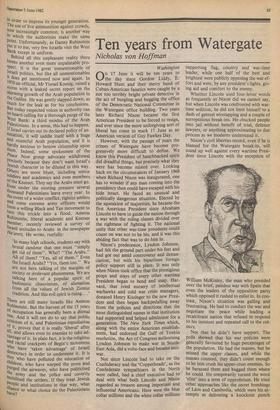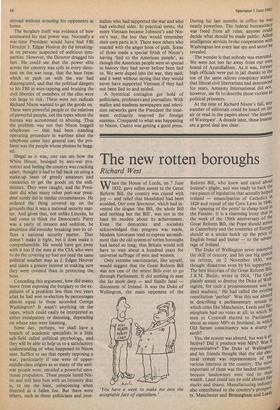Ten years from Watergate
Nicholas von Hoffman
Washington n 17 June it will be ten years to V the day since Gordon Liddy, E. Howard Hunt and their merry band of Cuban-American fanatics were caught by a not too terribly bright private detective in the act of burgling and bugging the office of the Democratic National Committee in the Watergate office building. Two years later Richard Nixon became the first American President to be forced to resign, and ever since the more unforgiving sort of liberal has come to mark 17 June as an American version of Guy Fawkes Day. However, with the passage of years the crimes of Watergate have become pro- gressively more difficult to define. We know this President of hunchbacked spirit did dreadful things, but precisely what they were has become misted over. Looking back on the circumstances of January 1969 when Richard Nixon was inaugurated, one has to wonder if any man coming into the presidency then could have escaped with his hide intact. He faced an unusual and politically dangerous situation. Elected by the squeakiest of majorities, he became the first American President since Abraham Lincoln to have to guide the nation through a war with the ruling classes divided over the rightness of fighting it. The national unity that other war-time presidents could count on was not to be his, and it was this abiding fact that was to do him in.
Nixon's predecessor, Lyndon Johnson, had felt the ground part under his feet and had got out amid controversy and denun- ciation, but with his bipartisan foreign policy support still in place. It was only when Nixon took office that the prestigious props and stays of every other wartime President began to bend and snap. Har- vard, that ivied nursery of intellectual warhawks and cold war crisis managers, donated Henry Kissinger to the new Presi- dent and then began backpedalling away from the policies and directions that the most distinguished names in that institution had supported and helped administer for a generation. The New York Times which, along with the entire American establish- ment, had endorsed the Gulf of Tonkin resolution, the Act of Congress authorising Lyndon Johnson to make war in South- East Asia, did a volte-face and became anti- war.
Not since Lincoln had to take on the Confederacy and the 'Copperheads', as the Confederate sympathisers in the North were called, had a chief executive had to deal with what both Lincoln and Nixon. regarded as treason among important and influential Americans. Here were the blue collar millions and the white collar millions
supporting flag, country and war-time leader, while one half of the best and brightest were publicly opposing the war ef- fort and were, by any president's lights, giv- ing aid and comfort to the enemy.
Whether Lincoln used four-letter words as frequently as Nixon did we cannot say, but when Lincoln was confronted with war- time sedition, he did not limit himself to a dash of genteel wiretapping and a couple of surreptitious break-ins. He chucked people into jail without benefit of trial, defence lawyers, or anything approximating to due process as we moderns understand it.
Nixon's civil liberties record, even if he is blamed for the Watergate break-in, will stand up well against every wartime Presi- dent since Lincoln with the exception of William McKinley, the man who presided over the brief, painless war with Spain that even the leaders of the opposition party which opposed it rushed to enlist in. In con- trast, Nixon's situation was galling and frustrating. He had to conduct the war and negotiate the peace while leading a recalcitrant nation that refused to respond to his insistent and repeated call to the col- ours.
Not that he didn't have support. The polls showed that his war policies were generally favoured by huge percentages of the population. He had the masses, but he missed the upper classes, and while the masses counted, they didn't count enough to let him crush his upper-crust enemies. So he harassed them and bugged them where he could. He temporarily turned the word `elite' into a term of opprobrium. He tried other approaches like the secret bombings of Laos and Cambodia, which were his at- tempts at delivering a knockout punch abroad without arousing his opponents at home.
The burglary itself was evidence of how attenuated his real power was. Normally a war-time President would have had FBI Director J. Edgar Hoover do the breaking- in on persons suspected of seditious sym- pathies. However, the Director dragged his feet. He could see that the power elite across the country was split in every direc- tion on the war issu,e, that the base from which to push on with the war had disintegrated, and that the political dangers to his FBI in wire-tapping and bruising the civil liberties of members of the elite were too large to risk. These were not radicals Richard Nixon wanted to get the goods on. These were powerful people or the relatives of powerful people, not the types whom the bureau was accustomed to abusing. Thus the problem was not that Nixon bugged telephones — that had been standing operating procedure in wartime since the telephone came into general use; the pro- blem was the people whose phones he bugg- ed.
Illegal as it was, one can see how the White House, besieged by anti-war pro- testors and feeling the country was cracking apart, thought it had to fall back on using a make-up team of greedy amateurs and romantics to get the goods on the sedi- tionists. They were caught, and the Presi- dent did what many other post-war presi- dent surely did in similar circumstances. He ordered the thing covered up on the grounds that it was a national security mat- ter. And given that, not unlike Lincoln, he had come to think the Democratic Party was a party of treason and sedition, he doubtless did consider breaking into its of- fices a national security matter. That doesn't make it right, but it does make it comprehensible. He would have got away with it too if the men at the CIA who were to do the covering up had not read the same political weather map as J. Edgar Hoover and taken a greater interest in making sure they were covered than in protecting the boss.
Conceding this argument, how did events move from exposing the burglary to the ex- pulsion of a president less than two years after he had won re-election by percentages almost equal to those accorded George Washington? It wasn't anything on the tapes, which could easily be interpreted as either exculpatory or damning, depending on whose ears were listening.
Some day, perhaps, we shall have a branch of academic specialists in a little sub-field called political psychology, and they will be able to help us to a satisfactory understanding of what happened to Nixon next. Suffice to say that openly opposing a war, particularly if one were of upper- middle-class origins as so many of the anti- war people were, entailed a powerful emo- tional propulsion. These people hated Nix- on and still hate him with an intensity that is, to say the least, unbecoming when directed at a fallen foe. But there were others, such as those politicians and jour-
nalists who had supported the war and who had switched sides. In practical terms, the more Vietnam became Johnson's and Nix- on's war, the less they would remember their own parts in it. There were others who reacted with the anger born of guilt. Some of those made a special fetish of Nixon's having 'lied to the American people', as though the American people were so special in history they had never before been lied to. We were duped into the war, they said; and it went without saying that they would never have supported Vietnam if they had not been lied to and misled.
A hysterical contagion got hold of politicians, professors and journalists. With malice and madness newspapers and televi- sion networks gave the President the treat- ment ordinarily reserved for foreign enemies. Compared to what was happening to Nixon, Castro was getting a good press. During his last months in office he was nearly powerless. The federal bureaucracy was freed from all rules; anyone could decide what should be made public. Allied intelligence services broke cooperation with Washington lest every last spy and secret be revealed.
The wonder is that nobody was executed. We were not too far away from our own brand of Ayatollahism. As .it was, former high officials were put in jail thanks to the use of the same odious conspiracy statute that liberal civil libertarians had denounced for years. Amnesty International did not, however, see fit to describe those victims as political prisoners.
At the time of Richard Nixon's fall, anY number of editorials could be heard on the air or read in the papers about 'the lessons of Watergate'. A decade later, those lessons are a good deal less clear.







































 Previous page
Previous page